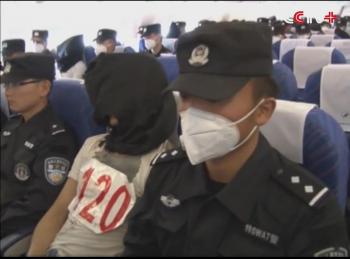
China must guarantee the fundamental human rights of over 100 forcibly returned Uyghur refugees
For immediate release
July 7, 2016 9:30 am EST
Contact: Uyghur Human Rights Project +1 (202) 478 1920
On July 8, 2015, Thailand forcibly returned over 100 Uyghur refugees to China. The decision of the Thai authorities placed the Uyghurs at high risk of mistreatment and contravened the principle of non-refoulement contained in Article 3 of the United Nations Convention against Torture (CAT). Thailand acceded to CAT on October 2, 2007.
“The international community strongly condemned Thailand’s decision to forcibly return over 100 Uyghur refugees to China in July last year. Since the deportations, there is little indication as to the location and welfare of these individuals. China must demonstrate it is meeting the fundamental human rights of returned Uyghurs as in the past the Chinese authorities have imprisoned and executed deported refugees,” said UHRP Executive Director Alim Seytoff in a statement.
Mr. Seytoff added: “The Uyghurs who fled to Southeast Asia did so because of the dire condition of political, economic and cultural rights in East Turkestan. The Thai authorities violated these Uyghurs’ human rights for a second time when they sent the refugees back to their oppressors. China must now show that their human rights are not being abused for a third time.”
The U.S. State Department, the European Union and The Office of the United Nations High Commissioner for Human Rights criticized Thailand’s forced return of over 100 Uyghur refugees to China. The Turkish Foreign Ministry also condemned the action and said it had occurred despite Turkish government attempts to stop the deportations.
Cited in the overseas media immediately after the returns, Chinese Foreign Ministry spokesperson Hua Chunying told reporters that China would take legal action against any Uyghurs deported from Thailand suspected of breaking the law. UHRP believes this statement was an indication the Uyghurs were already under suspicion and unlikely to receive a legal process meeting international standards. Sections of the Thai media also expressed skepticism over Chinese assurances regarding the welfare of the returned Uyghurs. In a July 11, 2015 editorial, the Bangkok Post wrote: “If they already face criminal charges, of course, the alleged promise by China to treat them well is false.”
Although a Thai delegation invited to China in late July 2015 claimed the Uyghur refugees were “well-treated,” details on Chinese government management of the visit and freedom of access to the returned Uyghurs were not disclosed to the public. Since the Thai delegation’s trip, information on the whereabouts of the deported Uyghurs has been scarce and specific charges faced by any of them unavailable.
According to a January 26, 2012 Radio Free Asia, two Uyghurs deported from Cambodia to China, Nurahmet Kudret and Islam Urayim, were handed life sentences after closed trials. It is unclear when the two men were sentenced, or of what charges they had been convicted. Islam Urayim reportedly witnessed security forces killing and beating Uyghur demonstrators on July 5, 2009 in Urumchi. A third Uyghur deported from Cambodia, Musa Muhammad, received a 17-year jail term, also on unknown charges. The welfare of seventeen other Uyghurs deported from Cambodia to China at the same time remains unknown.
A Radio Free Asia report published on December 20, 2012, described how one of the Uyghurs deported from Malaysiain August 2011 was imprisoned for three years on “separatism” charges following a closed trial. According to the report other Uyghurs deported at the same time had been jailed for up to 15 years; however, Radio Free Asia could not confirm the sentences. Ismail Semed, returned from Pakistan in 2003, and Shirali, returned from Nepal in 2002, were both executed after their deportations to China.
